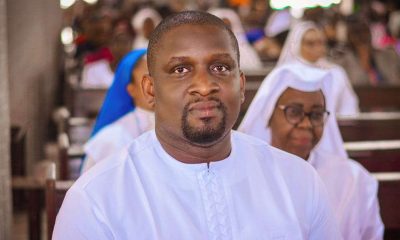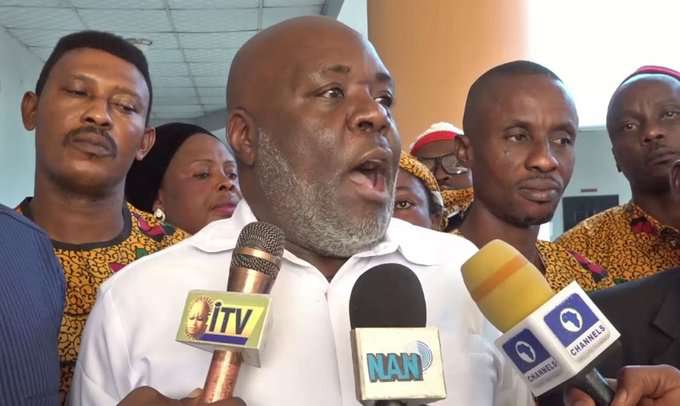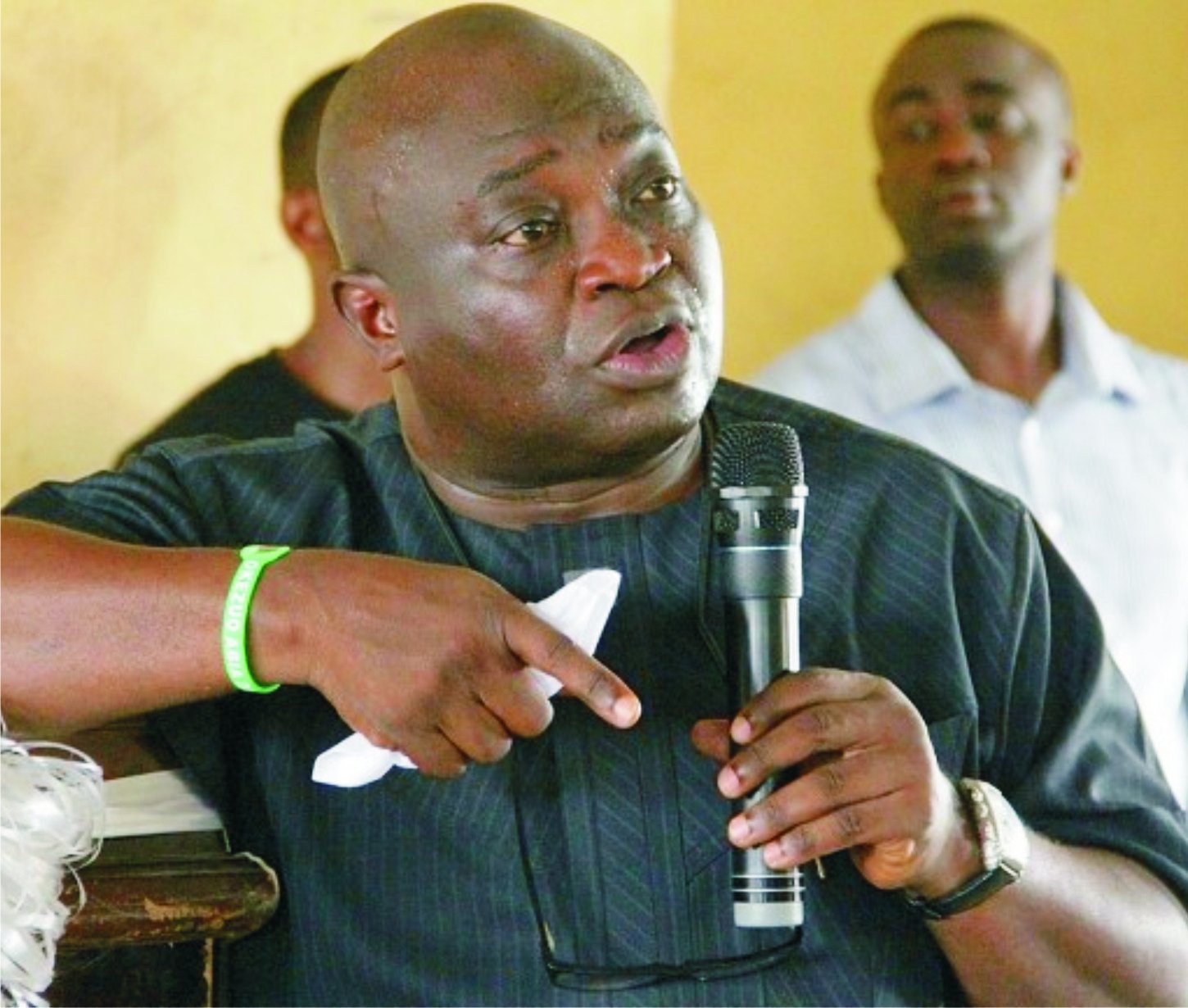Cover Story
Anambra election: Forces that shaped Soludo’s sweeping victory
Published
2 months agoon

Gov. Soludo
Governor Chukwuma Charles Soludo of the All Progressives Grand Alliance (APGA) has secured a decisive second term in the November 8, 2025 Anambra State governorship election, after winning in all 21 local government areas of the state in what observers described as one of the most conclusive mandates in the state’s recent electoral history.
The Independent National Electoral Commission (INEC) declared Soludo winner on Sunday at its collation center in Awka, with the Returning Officer, Prof. Edoba Omoregie, announcing that the APGA candidate polled 422,664 votes. His closest challenger, Nicholas Ukachukwu of the All Progressives Congress (APC), scored 99,445 votes, while other candidates, including Labour Party’s Dr. George Moghalu and African Democratic Congress (ADC) candidate John Nwosu, trailed further behind.
A total of 2,788,864 voters were registered for the election, but only 598,229 voters were accredited on election day. According to INEC, 584,054 of the votes cast were valid, while 11,244 were rejected, bringing the total votes counted to 595,298. Elections were cancelled in parts of Anambra West, Anaocha, Awka South and Onitsha South due to disruptions, affecting 10,481 votes, but the margin of lead between Soludo and his closest rival exceeded the number of cancelled votes, making the cancellations inconsequential to the final outcome.
“In view of the results and having satisfied the requirements of the law, I, Prof. Edoba Omoregie, hereby declare Chukwuma Soludo of the All Progressives Grand Alliance elected governor of Anambra State,” the Returning Officer announced.
For APGA, Soludo’s re-election extends the party’s 19-year grip on Anambra politics, having governed the state uninterrupted since 2006. For Soludo personally, the victory cements his transition from acclaimed technocrat to seasoned political actor with significant hold over the state’s shifting power blocs.
But winning all 21 LGAs, demands closer examination. It was not merely a reflection of personal appeal or incumbency advantage. It was a product of deeper political forces: zoning calculations, party machinery, elite consensus, strategic alliances, local economic realities, campaign messaging, and the limitations of an opposition that never quite found its electoral rhythm.
Zoning politics: the invisible hand
Perhaps, the most decisive element in the 2025 governorship race was the unwritten zoning arrangement that has guided Anambra politics for nearly two decades. The governorship has rotated among the state’s three senatorial zones – North, Central and South – since 2006. Soludo is from Anambra South and had served only one term. The widely accepted expectation was that the South should complete its eight-year slot before the office returns to Anambra Central in 2029.
Electing a new governor from the South would not necessarily disrupt this cycle, but it would reset political negotiations and timelines in ways the Central elite were not willing to accept. Thus, many influential power brokers in the Central – home to Awka, Onitsha, and some of the state’s most powerful political financiers – quietly aligned behind Soludo, seeing his second term as the most straightforward route to reclaiming power in 2029.
“It is simple arithmetic,” explained Awka-based political strategist, Chidi Nwafor. “If Soludo completes the South’s turn, then 2029 is Central’s turn. If you bring in another Southerner, the Central will wait longer. That is the whole logic.”
Elite political interest, not sentiment
This zoning logic also fractured Soludo’s challengers. The three leading opposition candidates – Ukachukwu, Moghalu and Nwosu – were all from Anambra South. Rather than weaken Soludo by splitting the Southern vote, the distribution only reinforced the perception that rotation remained on course and that Soludo remained the legitimate custodian of the South’s remaining four years.
APGA’s grassroots machinery
APGA remains the most deeply embedded political structure in Anambra. Nearly two decades of continuous rule have given the party an unmatched network at ward, village and polling unit levels. Local party coordinators, community gatekeepers, religious liaisons, youth mobilizers, market union influencers and women’s political circles provide it with a ready mobilisation network.
The party’s foothold remains strongest in semi-urban communities and rural blocs, where political messaging often comes through social norms rather than media campaigns. In such terrain, organizational continuity matters more than ideological debate.
APGA also demonstrated control of logistics. In many polling units, especially in towns like Nnewi, Aguata, Ekwulobia, Ogbunike and Igbariam, APGA agents and volunteers arrived well before polling started, guiding elderly individuals to accreditation points and coordinating transportation arrangements in hard-to-reach areas.
This does not mean the election lacked controversies. There were widespread reports of vote buying, with voters reportedly offered between ₦5,000 and ₦20,000 in some polling units across Nnewi South,
Ogbaru, Idemili South and Oyi. Both Soludo and his opponents accused one another of deploying money to sway voters.
Opposition weaknesses and voter disillusionment
One of the striking features of the election was voter turnout. Only about 21 percent of registered voters participated. This reflects deeper voter fatigue, economic stress, and declining faith in electoral processes, but it’s also an improvement from recent numbers.
Labour Party, despite its strong showing in the 2023 general election, entered the gubernatorial race fragmented. The Anambra LP chapter experienced prolonged leadership disputes leading up to the polls. Dr. George Moghalu is respected and has legacy political credibility in Nnewi and beyond, but LP did not present a united mobilizing force across the state.
The APC, though backed by federal presence, faced brand trust issues in Anambra. Ukachukwu campaigned vigorously and had strong support in parts of Nnewi South and Ihiala, but APC’s perception as a “non-Igbo party” remained difficult to overcome – despite Soludo himself maintaining cordial ties with President Bola Ahmed Tinubu.
The African Democratic Congress and Young Progressives Party candidates ran notable campaigns but lacked statewide structures capable of sustained get-out-the-vote execution. In short: the opposition campaigned, but APGA organized.
Incumbency factor – achievements and contradictions
Soludo’s first term was marked by ambitious reforms and uneven outcomes. He invested heavily in road infrastructure, particularly in semi-urban and rural belts, with over 400 km of roads built or rehabilitated. His administration also expanded primary and junior secondary school funding, restructured waste management in major cities, and initiated urban redevelopment projects in Awka and Onitsha.
However, his tenure was not without criticism. He clashed publicly with transport unions, market associations and church leaders. His rhetoric – often blunt – was viewed by some as dismissive. The removal of illegal structures and the enforcement of sanitation regulations angered traders and informal workers.
Yet, the actual voting pattern suggests that the benefits of his infrastructural projects outweighed grievances, especially among rural communities where new roads radically improved access to markets, schools and health centres.
“This victory is history made. You re-elected me with 73 percent of the votes. I am humbled. What I can tell you is that you have not seen anything yet,” he said. The message: continuity, not celebration.
Federal-state relations: strategic neutrality
Another subtle but important factor was the relationship between Soludo and President Tinubu. Unlike previous election cycles where federal power was perceived as aligned against APGA, the 2025 contest saw relative neutrality.
Soludo had cultivated stable administrative and political relations with the Presidency, especially around security coordination in the state. While APC leaders campaigned for Ukachukwu, there was no indication of aggressive federal intervention to tilt the contest.
This contributed to a calmer election atmosphere, which historically benefits incumbents.
Vote buying: the moral question
The 2025 election, like many recent Nigerian elections, was heavily influenced by financial inducement. Soludo himself acknowledged “rampant vote buying” in areas such as Nnewi South. Ukachukwu and Moghalu echoed similar concerns. While none of the candidates admitted complicity, the pattern was widespread enough to suggest systemic electoral monetization, not isolated abuse.
The effect is two-fold: Short-term: candidates with better funding or distribution networks gain advantage. Long-term: voter agency erodes further, deepening cynicism.
Yet, even in this context, vote buying alone does not explain a sweep across all 21 LGAs. The geography of turnout and the alignment of political blocs suggests a deeper consensus behind continuity.
What the result means for 2027 and beyond? The real political contest in Anambra has already begun, not for 2025, but for 2029.
With Soludo having four more years – barring unforeseen political reconfigurations – the governorship is widely expected to shift to Anambra Central. This sets the stage for early maneuvering among key political figures, including: Osita Chidoka, Uche Ekwunife, Udoji Okafor, Daniel Okonkwo, and elements within the Labour Party and APC structures in Awka and Onitsha.
APGA now holds the advantage of incumbency, continuity and statewide network. But the opposition has four years to rebuild, and will likely centre their messaging on governance performance, not rotation logic.
Continue Reading
Advertisement
You may like


Ezeokenwa is APGA national chairman, Supreme Court rules


Gen. Abubakar’s govt responsible for Nigeria’s problems – Chekwas Okorie


Guber: I’m in the race to rebuild Imo – APGA’s Ejiogu,


38-year-old Sylvester Ezeokenwa emerges new APGA national chairman


I’ve been advised to use thugs, police to invade APGA office but… Njoku


2023: Abia politics goes sour
Click to comment









